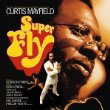Before Superfly, Mayfield had taken up the spiritual soul banner only previously carried by Sam Cooke. It was born out of a love for his people, a people who needed direction and divinity, not just dancing. They needed more than love songs for their sweetheart. They needed love songs to carry their souls. "People Get Ready," "We're a Winner" and "Move on Up" were unprecedented works for their time. They weren't the Mighty Clouds, Cleveland or Rance gospel. They weren't the Marvin, Stevie or Al soul. They weren't the JB or Meters funk. They were an unconscious merger of all the above.
These are the makings of Mayfield.
Put in context, Superfly arrives in the midst of a particularly golden period of prolific Mayfield output. Superfly is the studio hat trick following his self-titled debut and its follow-up, Roots. Superfly also follows one of the greatest live albums of all time, Live at the Bitter End. The Bitter set contains a comprehensive recap of Mayfield's solo and Impressions work with a bit more edge. His innovation with the guitar is even more showcased on Bitter, setting the stage for this 1972 landmark recording. Lastly, Superfly marks the beginning of a string of unparalleled Mayfield's soundtracks. Yet, nothing Mayfield had done before it said that he could realize writer/director Gordon Parks' vision of the harsh life and times of a hustler named Priest.
So, what would make Gordon Parks commandeer the righteous one to score a film about a conflicted drug dealer? Perhaps it was because by 1971 there was no better account of black love on wax than Nina Simone, James Brown, and Curtis Mayfield. Perhaps Parks knew that Mayfield wouldn't glorify the hustler's life, but would speak to the holistic effects of drugs in the community.
"l've met many people over the years. And in my opinion I have found that people are the same everywhere. They have the same fears, shed similar tears, die in so many years. The oppressed seem to have suffered the most in every continent-coast to coast. Now our lives are in the hands of the 'Pusherman.' We break it down in hopes that you might understand how to protect yourself. Don't make no profit for 'the man.'"
-Curtis Mayfield
...especially not at the demise of your own people
As stated in Mayfield's opening statement on "No Thing on Me," Superfly was a metaphor simultaneously addressing the drug game as it did any American corporate structure. Only Mayfield could make one of the funkiest jams send a message about the deleterious effects on the ‘corner boy' and the leeches who fed off him. "Freddie's Dead," laced with wah-wah pedaled guitar and a vicious turnaround break, addressed the "establishment" and its victims on lower end of the totem pole.
From first person to third person, Mayfield sings and speaks of Ron O'Neal's character, Priest, and the victims and vultures whose very existence depended upon his perpetual confliction.
"Little Child Runnin' Wild" was the narrator's take on how society creates a "Priest." With Master Henry Gibson's percussion swelling the groove, Priest gives his own take on what being the hustler afforded and cost.
"Pusherman" was hard to hate, despite the rawest lyrics allowed to ascend the charts by 1972. Mayfield's use of the "n" word and terms like "baddest bitches" was the ultimate in risk-taking tenacity. Mayfield is on record as saying he felt that each character needed to be portrayed in their realest element, which was why the then risque language proved essential to the integrity of songs like "Pusherman."
Parks' script and character development was important in that Priest has developed a conscious by the time we meet him and therefore Mayfield's score appropriately addresses that hypocrisy. More personable than Shaft, Priest isn't actually the arrogant hustler "Pusherman" says he is. He really just wants to love his woman (scored with the sultry "Give Me Your Love") and get out of the game. He's realized working for the man is working for the man no matter how dressed up it is, "Eddie You Should Know Better," addresses those who reject the notion of "straight living" whether the good life is in fear of the law, benefit for the man, the peril of the "people" or not.
Mayfield's insightful and holistic commentary stands alone and has more heart than any blaxploitation soundtrack of the ‘70's. The formula used on the score was even more successful that the film it was made. It was one Mayfiield would be tap again for The Staple Singers' Let's Do It Again, Aretha Franklin's Sparkle, and Gladys Knight & the Pips' Claudine-all gold certified, classic works. Mayfield remains an underrated architect of social commentary, funk, soul and most important-album artistry.
By Reg Jones

